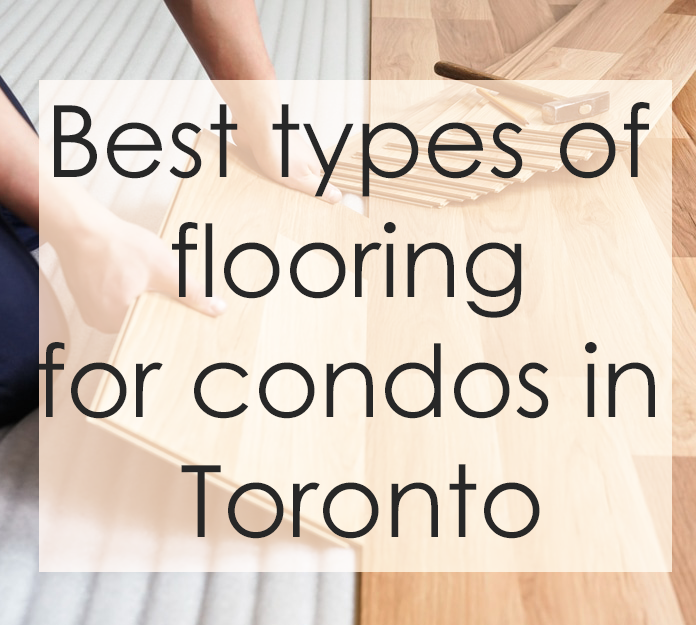When renovating condos, one of the most straightforward yet intricate aspects is modifying the flooring. Choosing suitable flooring offers multiple advantages, such as superior soundproofing and effective insulation to maintain warmth and durability against impacts. Nonetheless, the flooring in your condo experiences constant use, making it crucial to effectively minimize sound transmission from adjacent floors to ensure your satisfaction and comfort. In such cases, it becomes necessary to renovate the flooring promptly. In Toronto, there are five recommended flooring choices specifically tailored for condos:
- Laminate
- Hardwood
- Carpet
- Tile
- Vinyl
- Engineered Wood
- Concrete
When deciding on the ideal flooring for a condo or apartment, exploring the options available to condo owners in Toronto is essential. By considering the specific needs of condo owners, we can determine the most suitable flooring for condos in the area.
Laminate Flooring for Condos
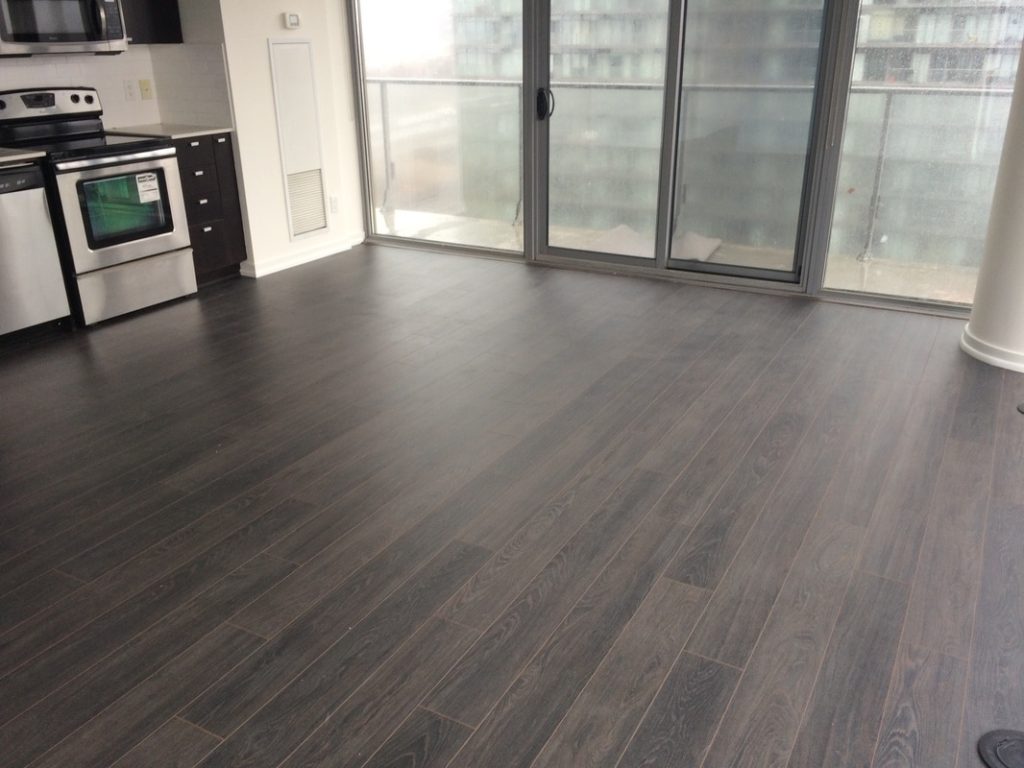
In terms of costs, the price range for laminate flooring typically falls between $0.50 and $3 per square foot. When it comes to DIY installation, laminates have a moderate difficulty level.
Laminates are known for their ability to closely replicate the appearance of hardwood flooring, showcasing its beauty. However, they may lack the authentic texture of genuine hardwood when walking on them. Despite this, laminates offer a consistent look and are generally more affordable than hardwood. They are also relatively easy to maintain and are commonly installed with a waterproof underlay to enhance durability.
MontDwell Group, a reputable condo renovation company in Toronto, frequently encounters laminates as the preferred flooring choice for condominium projects. This is primarily because laminates balance quality, cost-effectiveness, and ease of use, making them a popular flooring option among condo professionals in the area.
Pros of Laminate Flooring:
- Cost-effective: Laminate flooring is generally more affordable than other options, such as hardwood or stone.
- Various designs: Laminates come in multiple designs, patterns, and colours, allowing for versatile customization to suit different interior styles.
- Easy installation: Laminate flooring often utilizes a click-lock or floating installation system, making it relatively easy for DIY projects or quick, professional installation.
- Durability: Laminates are highly durable and resistant to scratches, fading, and stains. These floors can endure high levels of foot traffic and are ideal for homes with a lot of activity.
- Low maintenance: Laminate floors are easy to clean and require minimal maintenance. Regular sweeping and occasional damp mopping is typically sufficient.
Cons of Laminate Flooring:
- Lack of authenticity: While laminate flooring mimics the appearance of hardwood or other materials, it may need a more natural texture and feel of the real thing.
- Limited refinish options: Unlike solid hardwood, laminate floors cannot be sanded or refinished. Damaged planks usually need to be replaced rather than repaired.
- Susceptible to moisture damage: Although laminate floors are moisture-resistant, excessive exposure to water or high humidity can cause swelling or warping. It is essential to clean up spills promptly.
- Sound and feel underfoot: Laminate floors can be noisier and have a more rigid surface than carpet or certain types of hardwood, which may provide a different comfort level.
- Limited lifespan: While laminate flooring is durable, it generally has a shorter lifespan than hardwood or stone materials. Higher-quality laminates may last longer than lower-quality options.
Hardwood Flooring for Condominiums
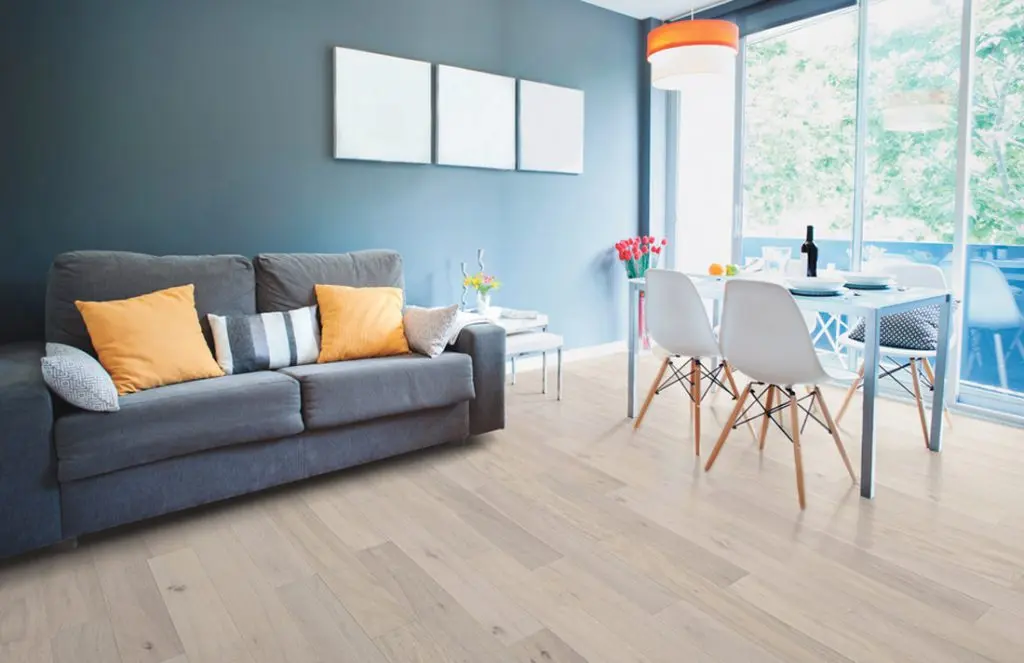
Hardwood flooring, despite being a pricier option, offers unparalleled durability and remains highly sought after. From a seller’s perspective, replacing the flooring with hardwood can instantly capture the attention of potential buyers. Additionally, opting for a light colour among the wide range of options can create an illusion of spaciousness, making your space appear larger.
The ease of cleaning and maintenance of hardwood flooring contributes to its attractiveness.
It’s important to note that the cost of hardwood flooring can vary significantly depending on the specific type of hardwood chosen. Still, it averages between $3 to $12 per square foot.
Pros:
- Aesthetically pleasing: Hardwood flooring offers a beautiful and timeless look, adding elegance and warmth to any space. It enhances the overall aesthetics of a room and has a high-end appeal.
- High resale value: Hardwood floors are highly desirable among buyers and can significantly increase the resale value of a property. They are considered a valuable investment that appeals to many homebuyers.
- Easy to clean and maintain: Maintaining and cleaning hardwood floors is a relatively straightforward task. Regular vacuuming, sweeping, and occasional damp mopping are typically sufficient to keep them looking their best.
Cons:
- Cost: One of the significant drawbacks of hardwood flooring is its cost. Compared to alternative flooring options, hardwood floors generally come with a higher price tag due to the costs associated with materials and installation. The overall cost can fluctuate depending on factors such as the specific hardwood type selected and the installation process’s intricacy.
- Noise: Hardwood floors can be loud to walk on, especially in high-traffic areas. They produce more noise than carpets or other softer flooring materials. Area rugs or acoustic underlayment can be used to reduce noise levels.
- Refinishing needs: Natural hardwood floors may require occasional refinishing to restore their appearance and durability in high-traffic areas. This process involves sanding down the top layer and applying a new finish, which adds to the maintenance requirements and costs.
- Water damage: Standing water or excessive moisture can cause damage to hardwood floors. To prevent water seepage and warping of the wood, it is essential to clean up any spills promptly. It’s essential to take precautions and avoid using hardwood in areas prone to moisture, such as bathrooms or basements.
Carpet Flooring
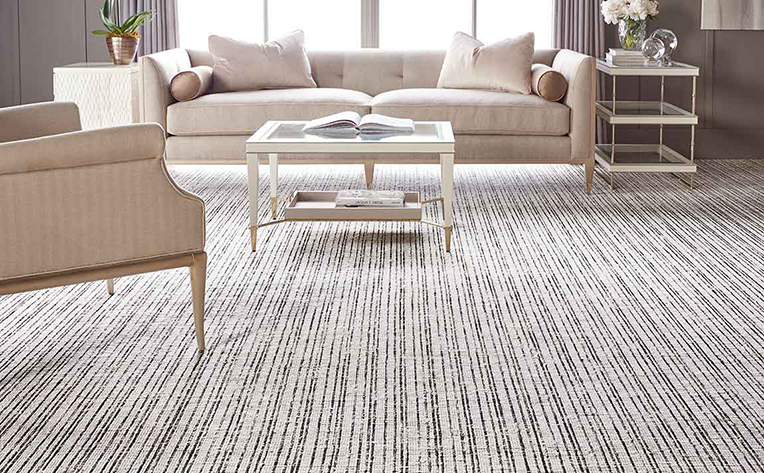
Regarding flooring options for condos, carpet is widely prevalent among homeowners. It comes in various colours, styles, and qualities, making it suitable for installation in living rooms and bedrooms. Carpet provides a cozy and comfortable feel throughout the house, offering insulation and warmth.
However, it’s important to note that carpet is not recommended for high-traffic areas such as doorways. Constant foot traffic can cause the carpet to wear down and become dirty over time. Similarly, it is advised against installing carpet in the kitchen or bathroom due to the risk of dirt accumulation, water absorption, and spills, which can lead to staining and hygiene issues.
In terms of cost, the price of a carpet can vary significantly based on its quality.
Standard carpeting and padding typically fall within the price range of $2 to $5 per square foot, offering various options to accommodate multiple budgets and personal preferences.
Pros:
- Soft and comfortable feel: Carpet provides a soft and cozy feel underfoot, adding a sense of comfort and warmth to a room. It offers a comfortable surface for walking, sitting, and playing.
- Soft look: Carpet can give a soft and inviting appearance to a room. It can create a warm and inviting ambiance, making the space feel more attractive and comfortable.
- Noise reduction: The carpet helps absorb and dampen sound, making it an excellent choice for reducing echoing and minimizing noise transmission within a home. It can help create a quieter environment, especially in multi-story condos.
Cons:
- Stain susceptibility: Despite advancements in fibre technology that have improved the stain resistance of carpets, they are still susceptible to staining. Spills, especially those containing pigmented liquids, can leave permanent stains on carpets if not promptly and properly cleaned.
- Hidden dirt: Even with regular vacuuming, carpets can accumulate hidden dirt, dust, and allergens within their fibres. This can impact indoor air quality and require periodic deep or professional carpet cleaning to maintain cleanliness.
Tile Flooring for Condos
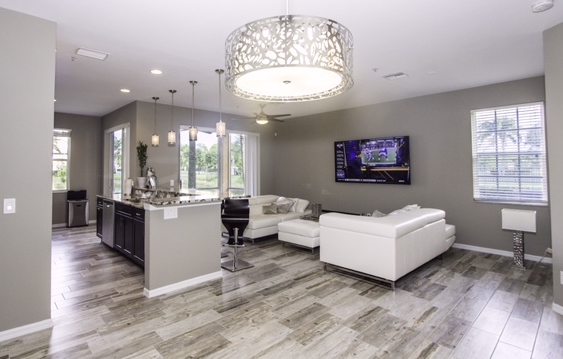
Regarding flooring options for condos, tile is recommended, particularly for areas prone to moisture and high traffic. While it can be a pricier option, tile offers several advantages, especially in the bathroom and kitchen.
One of the primary advantages of tile flooring in such areas is its ability to resist moisture and water.
In contrast to certain flooring types, tile is not susceptible to water damage, making it a perfect option for areas that are prone to spills or high humidity.
Additionally, the tile is relatively easy to clean, allowing quick and efficient cleanup of spills or messes.
Tile is also recommended for high-traffic areas like doorways or foyers due to its durability and ability to withstand heavy foot traffic.
Tile flooring can withstand frequent use without significant wear and tear damage.
However, one drawback of tile flooring is that it doesn’t retain heat well, which can be a concern in colder climates. One option is to install heating elements underneath the tile to address this issue. This helps provide warmth, especially in areas like the bathroom, where comfort is essential.
Regarding the cost of tile flooring for condos, it’s important to note that a wide range of tile types are available, leading to varying price points. The cost of tile can range from $1 to $20 per square foot.
Pros:
- Durability: Glazed ceramic tile is highly durable and resistant to scratches, making it suitable for high-traffic areas in condos. It can withstand heavy use and remains intact for a long time.
- Water resistance: Tile is inherently water-resistant, which makes it an excellent choice for areas prone to moisture, such as bathrooms and kitchens. It provides a protective barrier against water damage and is easy to clean and maintain in these spaces.
- Versatile options: Tile comes in various sizes, designs, and materials, including marble, porcelain, travertine, slate, and granite. This wide range of options allows for customization and the ability to match different design aesthetics and personal preferences.
- Easy to clean: The tile is relatively easy to clean, and stains are not a significant concern. Regular sweeping and mopping are usually sufficient to maintain its cleanliness and appearance.
Cons:
- Noise and echoes: One drawback of tile flooring is that it can be loud to walk on, especially in areas with high foot traffic. The hard surface can create echoing sounds, which may concern some condo residents.
- Cold underfoot: Tile tends to be naturally cold, which can be uncomfortable, particularly in colder climates. Heating systems for tile, such as radiant floor heating, can be costly to install and may require additional expenses.
- Prone to cracking: Tile is susceptible to cracking, especially if subjected to heavy impacts or significant structural movements. Repairing cracked tiles can be challenging and may require professional assistance.
- Stained grout: The grout lines between tiles can become stained over time, particularly in high-traffic areas or if not properly maintained. Regular cleaning and grout sealing are necessary to keep it looking clean and prevent discoloration.
Vinyl Condo Flooring
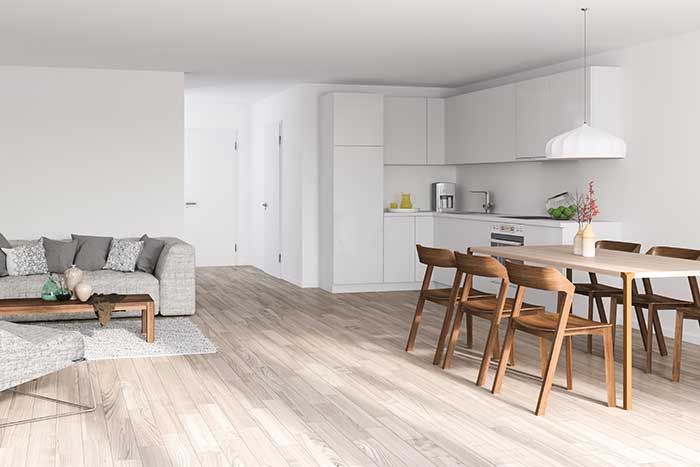
When considering flooring options for your condo, it’s essential to pay attention to vinyl, especially when it comes to soundproofing. With technological advancements, vinyl flooring has become highly durable, saving you money in the long run by not requiring frequent replacements. Vinyl is also waterproof, making it an excellent choice for moisture-prone areas, such as bathrooms or kitchens. Additionally, vinyl flooring offers soundproofing properties, helping to reduce noise transmission within your condo.
Vinyl flooring is designed to withstand heavy traffic, making it a durable option that can handle sand, dirt, and mud without significant damage. This longevity ensures your floor will maintain its quality and appearance over time. Furthermore, vinyl flooring offers a versatile range of styles, including options that emulate the look of hardwood or stone. This allows you to achieve an attractive aesthetic while enjoying the benefits of vinyl’s durability and soundproofing capabilities.
In terms of maintenance, vinyl flooring is relatively easy to care for, and its cost-effective nature helps keep maintenance expenses within a budget-friendly range.
Considering all these factors, vinyl flooring is an excellent choice for condos, providing enhanced soundproofing, durability, attractive designs, and affordable maintenance costs.
Pros:
- Durability: Vinyl flooring is renowned for its durability, which makes it a fitting choice for high-traffic areas in condominiums. Vinyl flooring exhibits resistance against scratches, stains, and dents, ensuring a long-lasting floor that can endure daily wear and tear.
- Water resistance: Vinyl flooring offers exceptional water resistance, making it an excellent option for moisture-prone areas like bathrooms, kitchens, and laundry rooms. It can be easily cleaned in these spaces.
- Soundproofing properties: Vinyl flooring offers soundproofing benefits, helping to reduce noise transmission within your condo. It can minimize the impact of footsteps and other sounds, creating a quieter and more peaceful environment.
- Wide range of designs: Vinyl flooring comes in various designs, including options that mimic the look of hardwood, stone, or tile. This allows you to achieve the desired aesthetic for your condo while enjoying the benefits of vinyl’s durability and practicality.
- Easy maintenance: Vinyl flooring is relatively easy to clean and maintain. Regular sweeping or vacuuming and occasional damp mopping are usually sufficient to keep it looking clean and fresh. It requires minimal upkeep compared to some other flooring options.
Cons:
- Susceptible to punctures: While vinyl flooring is durable, it can still be susceptible to punctures from sharp objects or heavy furniture. Care should be taken to avoid dragging or dropping items that could damage the floor.
- Not as luxurious as natural materials: Although vinyl can closely resemble natural materials like hardwood or stone, it may offer a different luxurious or authentic feel than the real thing. Some individuals prefer the genuine texture and aesthetic of natural materials.
- Limited repair options: In the event of damage, repairing vinyl flooring can be challenging. It isn’t easy to replace individual vinyl tiles or planks without noticeable differences in colour or texture. Sometimes, the entire section or room may need to be replaced for a seamless look.
- Environmental considerations: Some vinyl flooring options may contain chemicals or additives that release volatile organic compounds (VOCs). Choosing low-VOC or eco-friendly vinyl flooring options is essential if environmental concerns are a priority.
Engineered Wood Flooring Material for Condos
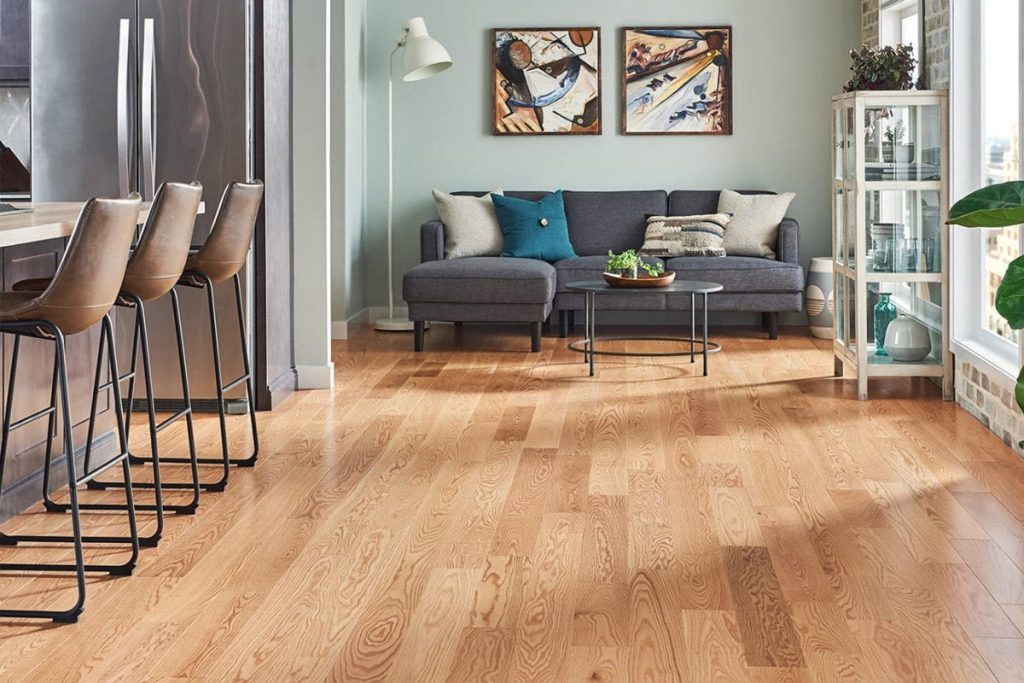
When it comes to flooring for condos, engineered wood is a popular choice. This type of flooring is created by binding wood veneers together with adhesives, forming a composite plank.
Engineered wood offers several advantages over traditional hardwood flooring.
One of the significant benefits of engineered wood is its manufacturing process, enabling longer lengths and wider widths when compared to solid wood.
This not only enhances the visual appeal of the flooring but also provides greater flexibility during installation.
Engineered wood is also known for its stability.
The layered construction of the planks makes them more resistant to warping, particularly when exposed to temperature fluctuations and humidity. This stability makes engineered wood a suitable option for various rooms, including bathrooms, as the installation process locks each plank tightly, minimizing the potential for moisture or water seepage.
In terms of cost, engineered wood flooring is relatively affordable. The average price ranges from $1.50 to $5 per square foot, offering a cost-effective solution for condo owners.
Pros:
- Aesthetically pleasing: Engineered wood flooring offers a beautiful and natural appearance, adding warmth and elegance to your condo. It can enhance the overall aesthetic appeal of your living space.
- Comfortable underfoot: Engineered wood flooring provides a soft and comfortable surface. It offers a warmer and more inviting feel than rigid flooring materials.
- Durability: Engineered wood flooring can be fairly durable and long-lasting when properly sealed and maintained.
- Refinishing option: One advantage of engineered wood is that it can be refinished multiple times. This allows you to restore its appearance and address any signs of wear or damage, increasing lifespan.
- Various options: Engineered wood flooring comes in various wood types which enables you to select the wood species and colour that best matches your desired style and interior decor. Additionally, engineered wood can be painted or stained for more colour options.
- Cohesiveness in open floor plans: Engineered wood flooring can help create a seamless transition and visual continuity between the kitchen and other rooms in an open floor plan. It can tie the different areas together and create a unified look.
Cons:
- Susceptible to water damage: Engineered wood flooring, like any wood product, is susceptible to water damage. It is essential to promptly clean up any spills or moisture to prevent warping, staining, or other water-related damage.
- Darkening with age: Over time, some engineered wood floors may darken or change in colour due to exposure to light. This natural aging process can result in a slightly different appearance than when it was first installed.
- Cost: Engineered wood flooring can be expensive, depending on the specific product and wood species chosen. The initial installation and materials investment may be higher than other flooring options.
- Vulnerable to dents: Softer wood species used in engineered wood flooring can be more susceptible to denting from heavy furniture or dropped objects. It is essential to take precautions to minimize the risk of denting.
- Maintenance challenges: While engineered wood flooring is relatively easy to clean, it can be more challenging to maintain compared to materials like vinyl or laminate. Immediate cleaning of water and spills is crucial to prevent damage. Additionally, dust can be a common issue during refinishing or the installation of unsealed wood.
Concrete Flooring for Condos
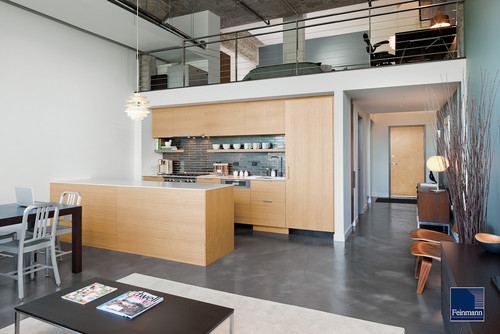
Concrete floors offer many advantages when it comes to flooring for condos. They serve a dual purpose as both the finished and structural floors, making them an innovative and efficient choice. Concrete has gained popularity among designers and homeowners due to its versatility, cost-effectiveness, and the wide range of options it provides.
One of the notable benefits of concrete floors is the ability to stain them, offering countless design possibilities.
Concrete has the remarkable ability to be transformed into a multitude of styles, colours, and patterns, whether through acid staining, painted overlays, micro toppings, radiant floors, or personalized designs.
This versatility enables you to create a customized and visually appealing look that perfectly complements the interior of your condominium.
Gone are the days when concrete flooring had to be gray and dull. Concrete can be coloured and textured, adding vibrancy and character to your space. Techniques like applying textures, patterns, saw cuts, and more can breathe new life into this traditional substrate, elevating its visual appeal.
In terms of cost, concrete floors are relatively economical. Polishing a plain gray slab to achieve a lustrous sheen typically costs around $2 to $6 per square foot. This affordability makes concrete flooring an attractive option for condo owners looking for a cost-effective yet stylish solution.
Pros:
- Durability: Concrete floors are highly durable and can withstand heavy use and traffic, making them ideal for long-lasting flooring in condos.
- Easy to maintain: Concrete floors are relatively easy to clean and maintain. Regular sweeping and occasional mopping is usually sufficient to keep them looking clean and fresh.
- Environmentally friendly: Concrete is an eco-friendly flooring option as it utilizes existing materials and reduces the need for additional resources. It can also contribute to energy efficiency by retaining cool temperatures in warmer climates.
- Long-lasting: Properly installed and maintained concrete floors can last long, providing a durable flooring solution that stands the test of time.
- Versatile: Concrete floors offer versatility in terms of design options. They can be stained, painted, or textured to create various looks and patterns. Additionally, they can serve as a solid foundation for applying other types of flooring, giving you flexibility for future renovations.
Cons:
- Hard surface: The hardness of concrete floors can make walking or standing on them uncomfortable for extended periods. Area rugs or cushioned furniture can help alleviate this issue and provide more comfort underfoot.
- Poor heat retention: Concrete floors do not retain heat well, leading to a colder feeling underfoot, especially in cooler climates. The use of rugs or radiant heating systems can help mitigate this drawback.
- Moisture susceptibility: Concrete floors can be susceptible to moisture intrusion if improperly sealed. This can lead to potential issues such as staining, mould growth, or damage. Ensuring proper sealing and regular maintenance is essential to prevent moisture-related problems.

